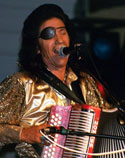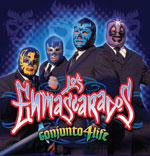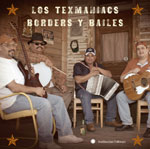Last night’s Grammy Awards weren’t just about Taylor Swift, Lady Gaga, and the wonders of Auto-Tune. At the pre-telecast awards ceremony, a handful of accordionists picked up awards, too. Let’s review the big winners:
Best Cajun or Zydeco Album: Buckwheat Zydeco
The Cajun/Zydeco category has only been around for three years, but it’s already produced three different winners. Buckwheat Zydeco played organ for the legendary Clifton Chenier’s band before picking up the accordion and, since Chenier’s death in 1987, has become zydeco’s best-known (and most mainstream) artist. Lay My Burden Down is probably his most mature album to date, mixing his party-time zydeco with inspired covers (including “When the Levee Breaks”).
Buckwheat Zydeco: Ninth Place mp3
Buy Lay Your Burden Down by Buckwheat Zydeco
Best Tejano Album: Los Texmaniacs
We reviewed this album last summer and were excited to see it recognized last night. Both Texmaniacs leader Max Baca and accordionist David Farias have shared in other Grammy wins, but this was the first for their group that combines blues and rock with traditional conjunto. On Borders y Bailes, released on Smithsonian Folkways, they breathe new life into the century-old music of the Texas Rio Grande Valley.
Los Texmaniacs: Redova mp3
Buy Borders y Bailes by Los Texmaniacs
Best Norteño Album: Los Tigres Del Norte
With more than 32 million records sold in their 40-year history, Los Tigres have long been the kings (or “Los Jefes de Jefes”) of norteño music, so their victory was no surprise. What’s surprising, though, is that Tu Noche Con… is their first live album. Los Tigres take their role as spokesmen of the people very seriously, and the album contains a great mix of the politically and socially-charged corridos, rancheras, ballads and cumbias that have built them a loyal following.
Los Tigres Del Norte: Somos Mas Americanos mp3
Buy Tu Noche Con… Los Tigres Del Norte by Los Tigres Del Norte
And finally, for those wondering how 18-time Grammy winner Jimmy Sturr would fair after the polka Grammy’s demise last year — he lost to Loudon Wainright III for Best Traditional Folk Album. There’s always next year.
 It’s a sad day for accordion and Tejano music fans; legendary accordionist Esteban “Steve” Jordan died last night of complications from liver cancer. He was 71 years old.
It’s a sad day for accordion and Tejano music fans; legendary accordionist Esteban “Steve” Jordan died last night of complications from liver cancer. He was 71 years old.



